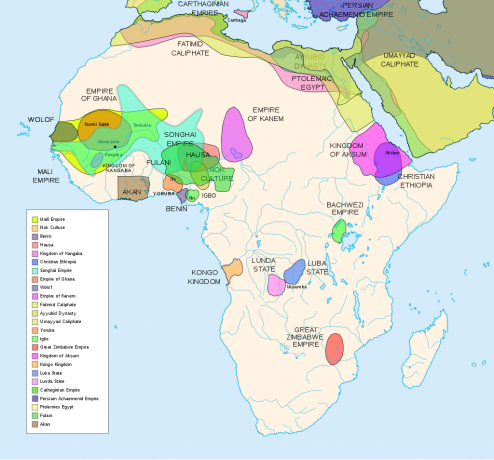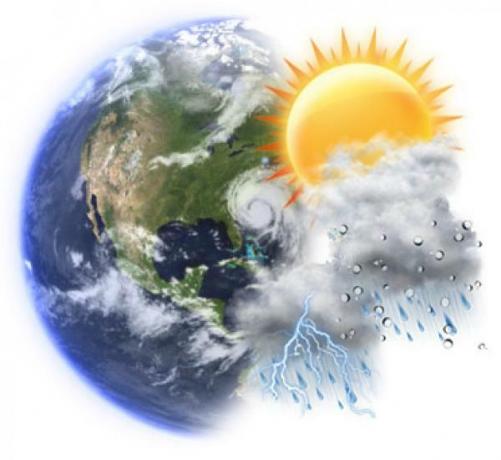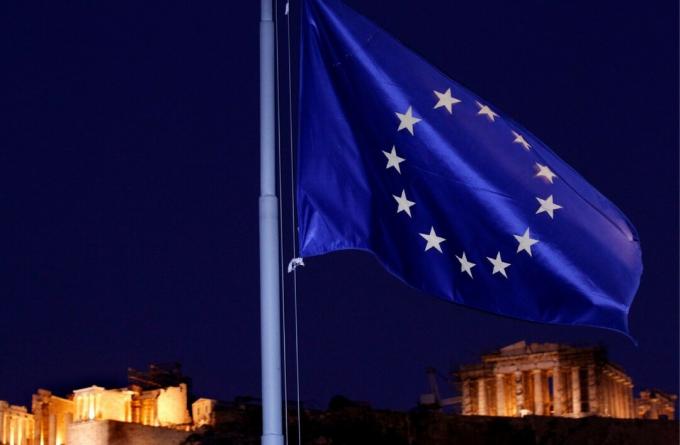When talking about Africa, unfortunately, the tendency of most people is to generalize as if it were one country. In this, all aspects of these so rich people form what the writer Chimamanda Ngozi Adichie calls “Unique Story” when, in fact, there are several stories, even about the same place.
Next, we will deal with the first civilizations that inhabited the vast African continent, telling about their story, economy, art and culture.
Index
- about the african continent
- the Berber people
- The Bantu (bantu)
- The Soninkés or Empire of Ghana
- Songhai Empire
- Kingdom of Cush (Kush)
- Films about African History
about the african continent
The territory of the African continent is bathed by the Atlantic and Indian Oceans, in addition to the Mediterranean Sea. It comprises 54 countries divided into five regions, namely South, West, Central, North and East Africa. It is estimated that the total population of Africa is approximately 800 million inhabitants who speak more than a thousand different languages. The main ones are Arabic, Swahili and Hausa.
Apparently, the African continent was home to the first human beings. Archaeological expeditions found, there, the oldest fossils of hominids, with about five million years. Later, they evolved into more advanced human forms such as Homo Habilis and Homo Herectus.

the Berber people
Known as the nomads of the Sahara, the Berber people traversed the desert in search of territory. Facing water shortages and strong sandstorms, they traded along the paths they passed. The main products they traded were salt, gold, copper, glass, spices, precious stones and feathers.
Their main means of transport were camels and, on board these resilient and adaptable animals, they stopped at oases (small fertile desert regions) to rest and obtain water. Its organization is of the patriarchal type, in families called ikhs. Among its culinary specialties are Burke (pastry stuffed with meat, onion and fried eggs), lamb and vegetables, among other dishes.
The considerable importance of these people for Africa is due to the transmission of culture and information that they promoted during their travels. With Persian and Iranian origins, the Berber people today occupy the Sahara and Sahel regions, corresponding to Morocco and Algeria. They are probably the oldest people in Africa, appearing in Egyptian documents from 4,000 BC. Ç.
The Bantu (bantu)
Group that inhabited the region, today, corresponding to Cameroon, Mauritania, Mali and Nigeria, northeast of Africa. Unlike the Berber people, they had no nomadic characteristics and were organized in villages commanded by a chief. They lived on earnings from agriculture, fishing and hunting.
- Free Online Inclusive Education Course
- Free Online Toy Library and Learning Course
- Free Online Math Games Course in Early Childhood Education
- Free Online Pedagogical Cultural Workshops Course
Through their knowledge of metallurgy, they gained an advantage in conquering neighboring peoples, eventually forming the Kingdom of Congo. Kingdom, this one, which dominated much of the Northwest African region. Around 2000 BC C., expanded their territory towards the equatorial forest of central Africa and, later, to the east and south of the continent.
They were ruled by the king, the manicongo, to whom they deposited sacred powers capable of influencing wars, health and harvests. The king preserved the right to levy taxes from all the tribes that formed the kingdom, in the form of food and merchandise. Part of what was collected he applied to his private army and royal officials.
The Soninkés or Empire of Ghana
Inhabitants of the southern part of the Sahara desert, these people were organized into tribes that formed the empire commanded by the Kaya Maga kings. Together with relatives and friends, the kings formed the nobility, to whom the inhabitants had to pay taxes. From the villages also came soldiers and farmers who worked in royal lands.
The Soninké lived from agriculture, fishing and animal husbandry. As they inhabit a region rich in gold, they extracted the ore to exchange for other products with the Berber people. Over time, the Empire of Ghana, constituted by the Soninkés they inhabited, became an area of intense trade.
Songhai Empire
A pre-colonial African state that has inhabited, since the 8th century, the northwestern region of Africa today, corresponding to the countries of Niger, Mali and Burkina Faso. Its capital was the city of Gao, situated on the banks of the Niger River. The ethnic group that led him was the Songhai who lived off fishing, farming, herding, trading in salt and gold.
When they conquered Mali in the 15th century, they formed a single empire. The Songhai Empire controlled most of West Africa's trade between the 15th and 17th centuries. Gao was conquered by the Mali Empire in 1325 and independence came only in 1464.
Kingdom of Cush (Kush)
This people developed in the northeast region of the African continent, corresponding to Sudan, between 2000 BC. Ç. and 350 d. Ç. The kingdom was ruled by a king and, under his command, they dominated metallurgy, in addition to practicing maritime trade in the Red Sea. They lived off hunting and fishing, but later learned to dam water to irrigate their land.
Also known as the Kingdom of Nubia, for a long time, it was dominated by Egypt, a civilization from which it received religious, political and architectural influence. This is noticed by the construction of temples, palaces and pyramids on the banks of the Nile, in addition to their polytheism. Its capitals were Napata and Méroe.
Films about African History
- Mandela, long road to freedom – 2013
- The Last King of Scotland – 2006
- Hotel Rwanda – 2004
- The Last King of Scotland – 2006
- The Shadow and Darkness – 1996
- Quilombo – 1984
The password has been sent to your email.


